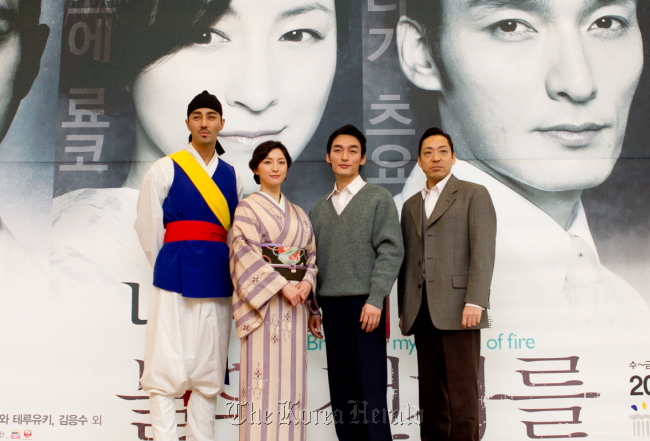Korean-Japanese director brings period drama to Seoul
‘Bring Me My Chariot of Fire’ stars Korean Cha Seung-won, Japanese Tsuyoshi Kusanagi
By Claire LeePublished : Jan. 31, 2013 - 19:47
Korean-Japanese director and playwright Chong Wishing is in Seoul to showcase his period drama set in colonial Korea in the 1920s, starring local TV and film actor Cha Seung-won in the leading role.
The play, titled “Bring Me My Chariot of Fire,” tells the story of Lee Sun-woo (played by Cha), who is the leader of Namsadang, an itinerant troupe of male performers in Korea under Japanese colonial rule.
He forms a genuine friendship with Japanese school teacher (played by Japanese actor Tsuyoshi Kusanagi), who has a strong attachment to Korea’s traditional culture and makes efforts to preserve it. Lee’s troupe does various performing acts such as acrobatics, singing, dancing and “jultagi,” traditional Korean performance of tightrope walking.
Chong started writing the play about three years ago, after interviewing Korea’s traditional artists who practice what was once performed by Namsadang in the 1920s.
The play, titled “Bring Me My Chariot of Fire,” tells the story of Lee Sun-woo (played by Cha), who is the leader of Namsadang, an itinerant troupe of male performers in Korea under Japanese colonial rule.
He forms a genuine friendship with Japanese school teacher (played by Japanese actor Tsuyoshi Kusanagi), who has a strong attachment to Korea’s traditional culture and makes efforts to preserve it. Lee’s troupe does various performing acts such as acrobatics, singing, dancing and “jultagi,” traditional Korean performance of tightrope walking.
Chong started writing the play about three years ago, after interviewing Korea’s traditional artists who practice what was once performed by Namsadang in the 1920s.

“Namsadang members were considered the lowest class of people at the time,” he said through the National Theater of Korea press material. “And things became even more difficult for them when Korea was colonized by Japan. I became curious about their lives, and started imagining the kind of friendships they must have had with each other.”
The show first premiered in Tokyo in November last year, receiving rave reviews from audiences there. Almost all of the shows of the Tokyo run received standing ovations, according to the National Theater of Korea.
For film and TV actor Cha, whose previous works include films “Blood Rain” (2005) and “Secret” (2009), this play is his stage debut. The project was a great challenge for the actor, especially because he had to master jultagi for the show.
“Jultagi was one of the scariest moments in my life,” he said at a press conference in Seoul on Wednesday. “I’d have nightmares about it. During the third show in Japan, I actually fell from the rope. I hope I get better at it for the Seoul run.”
Japanese actor Kusanagi, better known as a member of Japan’s idol group SMAP from the 1980s, plays the teacher who gets drawn to Korea’s traditional culture. Both Cha and Kusanagi said the play would help improve relations between Korea and Japan, which has been strained by the territorial dispute over Dokdo ― Korea’s easternmost islets.
“The Korea-Japan relations were actually a lot worse in the 1920s, when this play takes place,” said Cha. “This show talks about a special and rare friendship between a low-class Korean and a Japanese teacher in such difficult times. We hope our viewers can feel positive and hopeful about the relations between the two countries by watching this play.”
Japanese actress Ryoko Hirosue, whose 1999 film “Poppoya” (Railroad Man) enjoyed much popularity in Korea, is playing the role of the Japanese teacher’s sister. “I was very touched by the enthusiasm of Korean actors whom I got to work with for this play,” she said.
“In spite of the cultural differences, our crew really came together as a team and created this great project. I had never before worked on a play for which I received a standing ovation for every single show of the run. Taking part in this play has been a great joy for me so far, and I hope many viewers in Korea will come and see us perform.”
“Bring Me My Chariot of Fire,” performed in a mix of Korean and Japanese with subtitles in both languages, runs until Feb. 3 at the National Theater of Korea in Jangchung-dong, Seoul. For more information, call (02) 3472-1421.
By Claire Lee (dyc@heraldcorp.com)


















